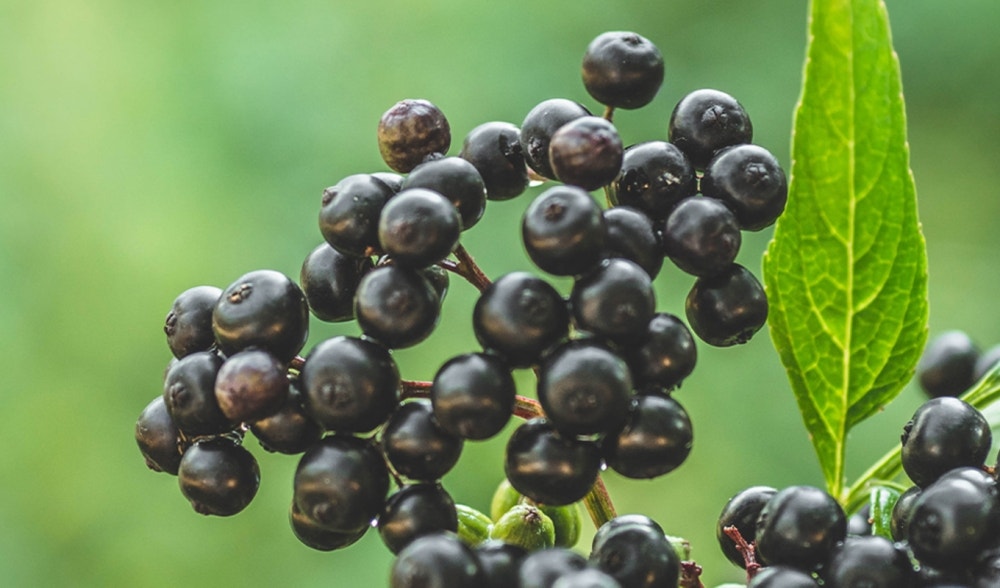Elderberry has long been used in folk medicine to treat ailments ranging from insect bites to haemorrhoids. More recently, however, it has seen a surge in popularity as a remedy that can boost immune system function.
Some sources have even hailed elderberry supplements as a "cure" for the common cold.
In this article, we will see more closely the latest research on the effectiveness of elders in strengthening the immune system and in the treatment of symptoms of colds and seasonal flu.
First, let’s see what elder is.
What is the elder?
The elder is a family of shrubby flowering species native to North America and Europe. These plants produce clusters of tiny dark berries, usually purple, blue or black. Traditionally, the elder has had many uses, both medicinal and other. In medieval Europe, the elder was thought to promote longevity.
Among Native Americans, its fruits and flowers were used to treat pain and fever, while twigs and branches were used to build baskets, flutes and dart rods. Although elderberry berries are known for their medicinal properties, berries can be toxic if consumed raw. However, most species are safe to eat once cooked.

Elder and flu
Although the evidence is limited, current research seems to indicate that elders may possess properties that help fight the flu virus and alleviate the symptoms of cold and flu.
For example, a 2011 study [1] investigated the antimicrobial properties of elderberry liquid extract in a laboratory environment. Researchers reported that the extract prevented the growth of certain types of streptococcal bacteria and influenza viruses. Similarly, a 2012 test-tube study reported that elder has several properties that enable it to combat influenza [2].
Finally, according to a 2017 study, the branches and berries of the plant contain powerful antioxidants. [3]
Other studies have assessed the effects of elders on the symptoms of colds and flu in humans. A randomized, double-blind 2016 study compared the effects of a placebo to an elder supplement among 312 airline passengers [4].
There were no significant differences in who developed a cold after flying. However, researchers reported that people in the placebo group tended to have longer and more severe colds than those in the elderberry group.
They concluded that further research is needed to confirm this effect.
A 2018 research review [5] reported that elderberry supplements have helped alleviate upper respiratory symptoms such as:
- rhinorrhoea;
- nasal congestion;
- cough.
However, this study evaluated only the data of 180 participants. Larger sample size is needed to understand if these effects apply to most people. Although current evidence seems promising, further research is needed to understand how effective the elder is for treating colds and flu.
It is important to remember that while elderberry could potentially help with flu symptoms, it is not a substitute for the annual flu vaccine.
Other benefits
Elderberry is highly nutritious. It is a good source of vitamin C and dietary fibre, although it is low in carbohydrates and fats.
And like other berries, elderberry berries contain powerful antioxidants, including:
- phenolic acids;
- flavanols;
- anthocyanins.
Antioxidants are believed to play a role in the prevention of chronic diseases such as diabetes, heart disease and cancer.
Conclusions
Elder has shown some promise in the treatment of upper respiratory symptoms associated with colds and flu. It may also have the ability to reduce the severity of cold and flu symptoms. However, further studies are needed to confirm the dosage, safety and efficacy of elderberry supplements.
References:
[1] https://www.ncbi.nlm.nih.gov/pmc/articles/PMC3056848/
2[] https://www.sciencedirect.com/science/article/abs/pii/S1756464619300313?via%3Dihub
[3] https://www.sciencedirect.com/science/article/abs/pii/S0926669016306872?via%3Dihub
[4] https://www.ncbi.nlm.nih.gov/pmc/articles/PMC4848651/
[5] https://www.sciencedirect.com/science/article/abs/pii/S0965229918310240?via%3Dihub


Comments
Write a comment about the article